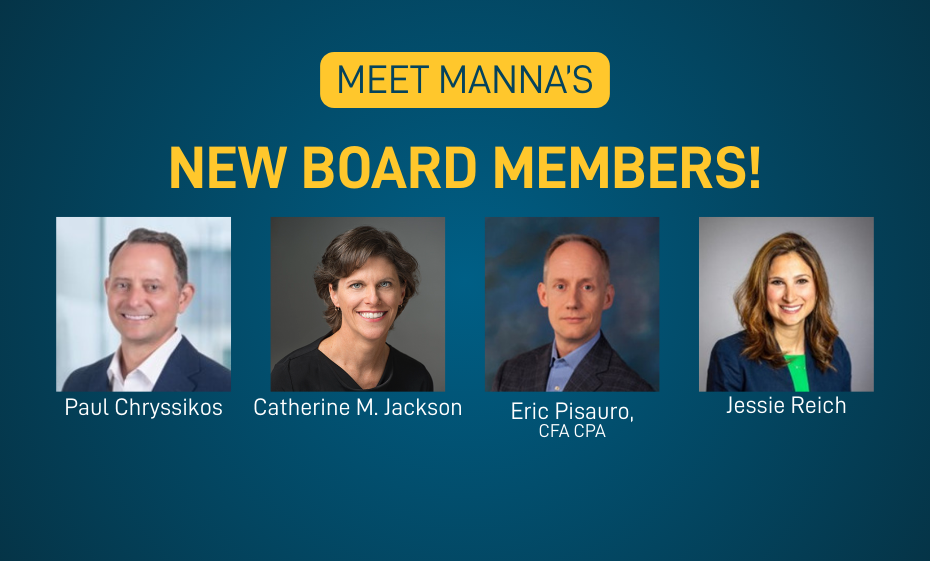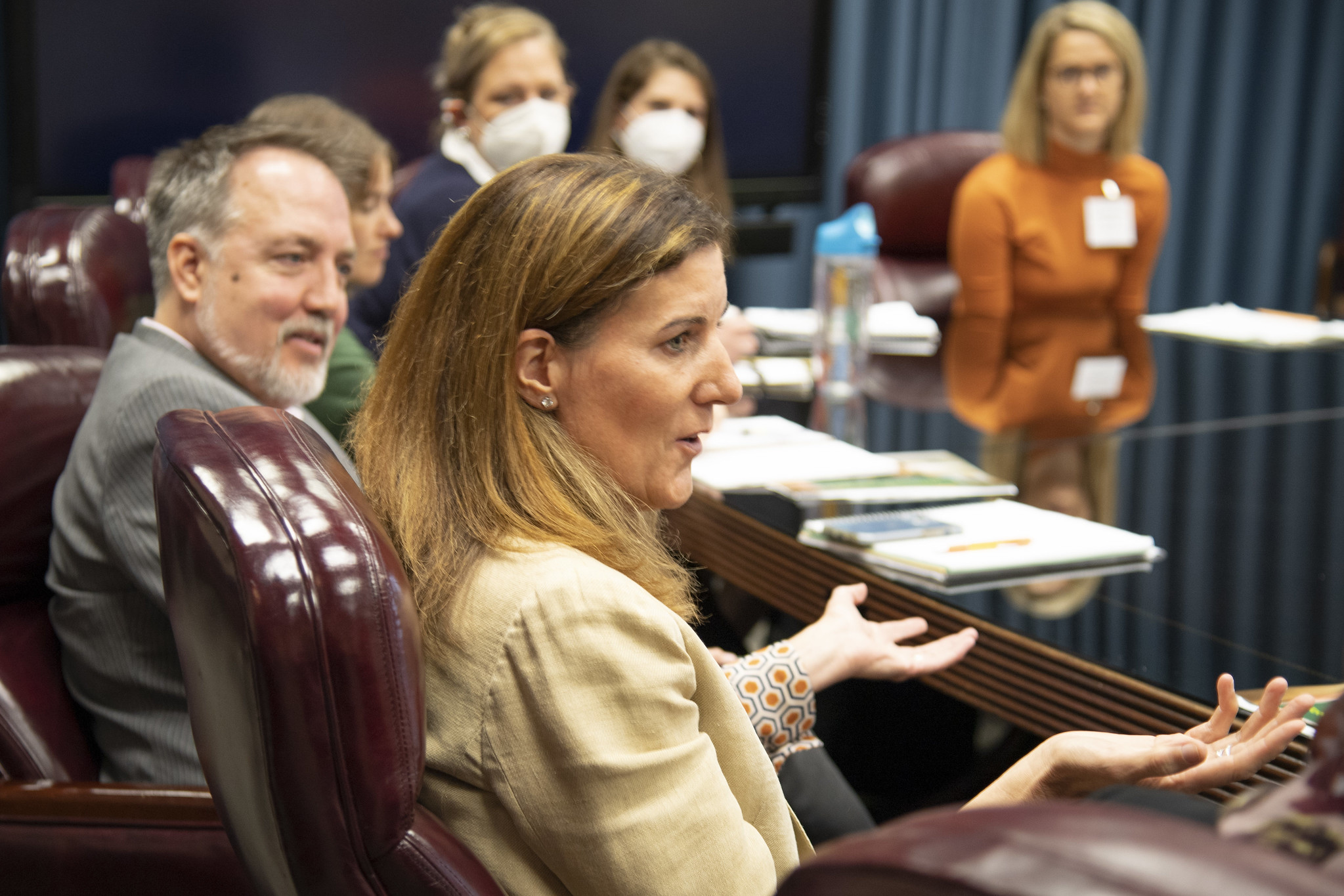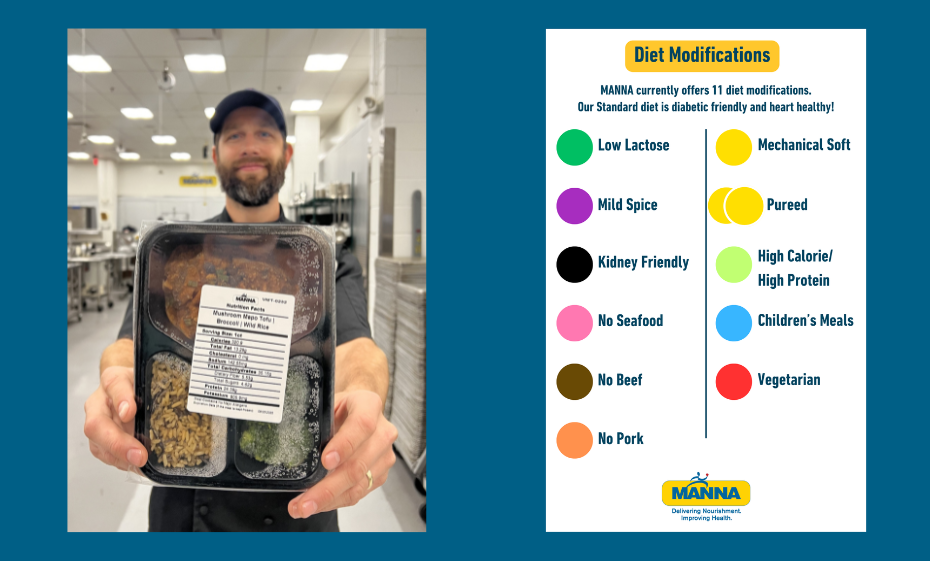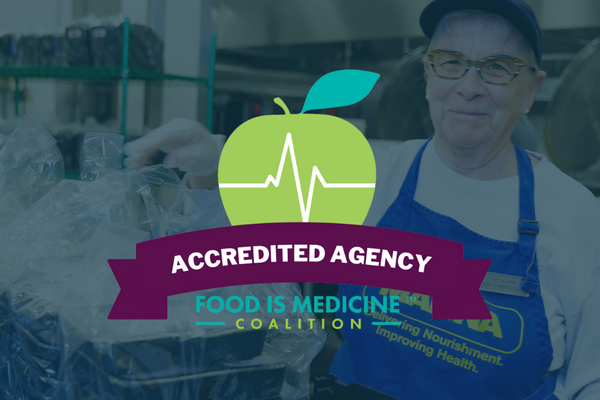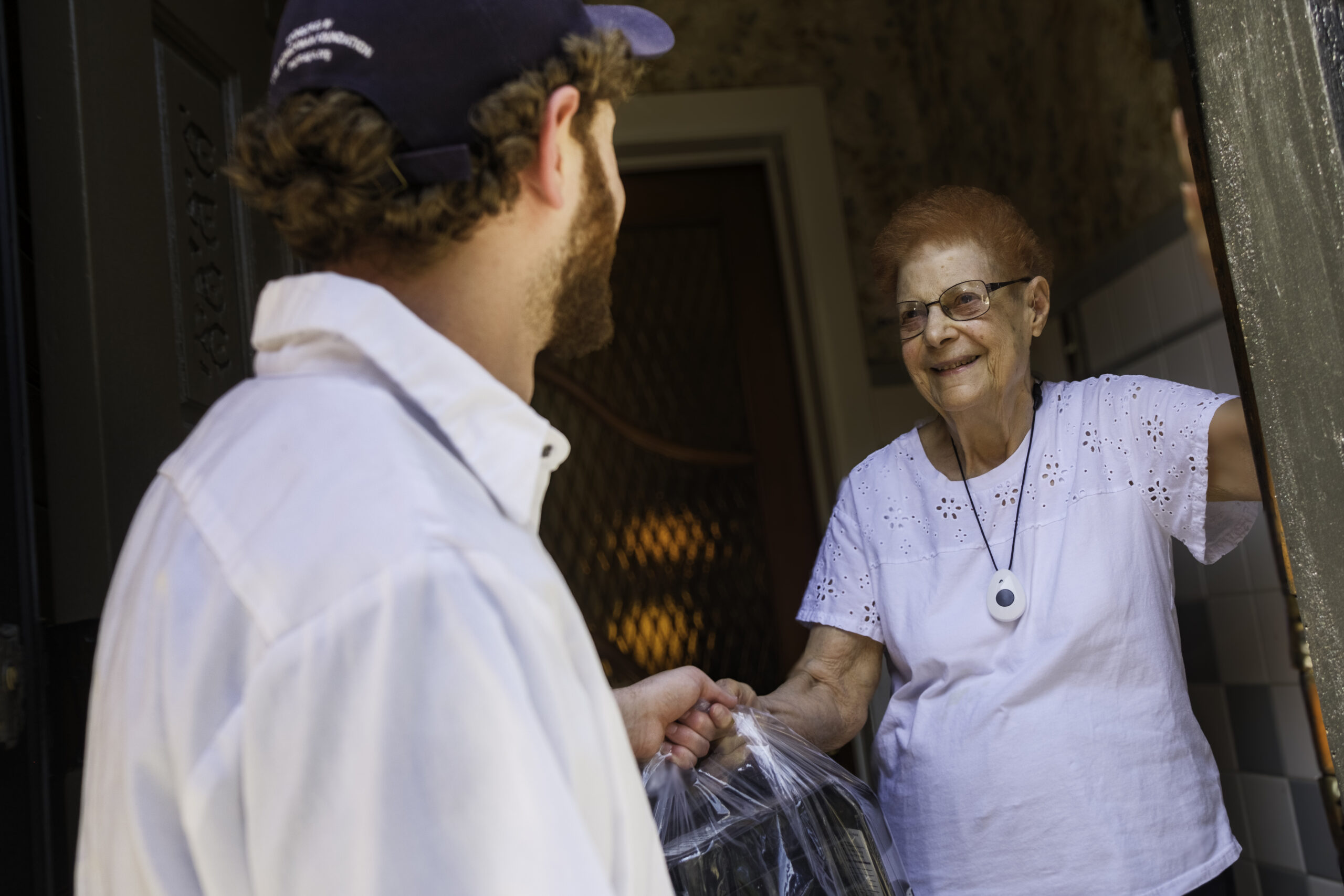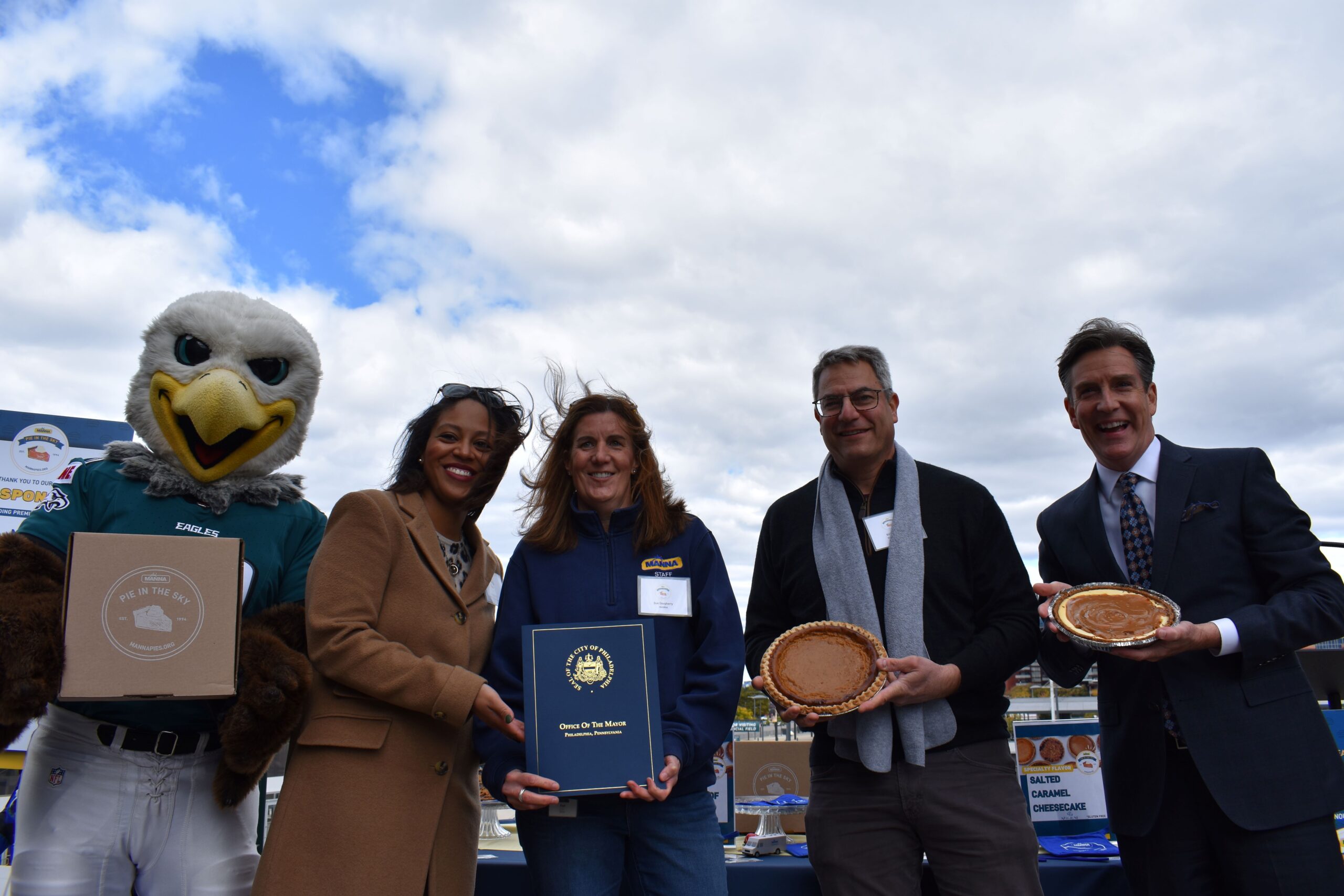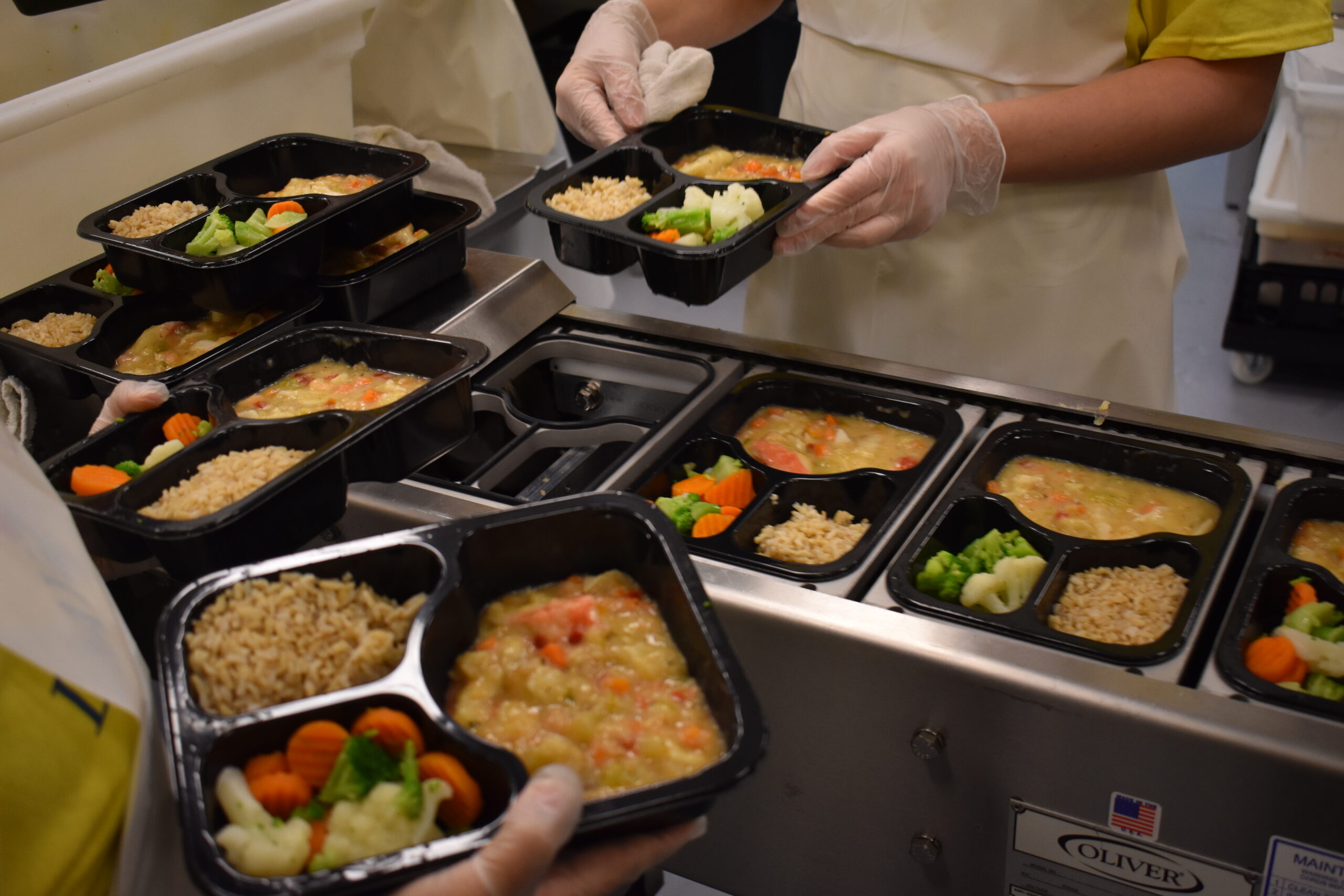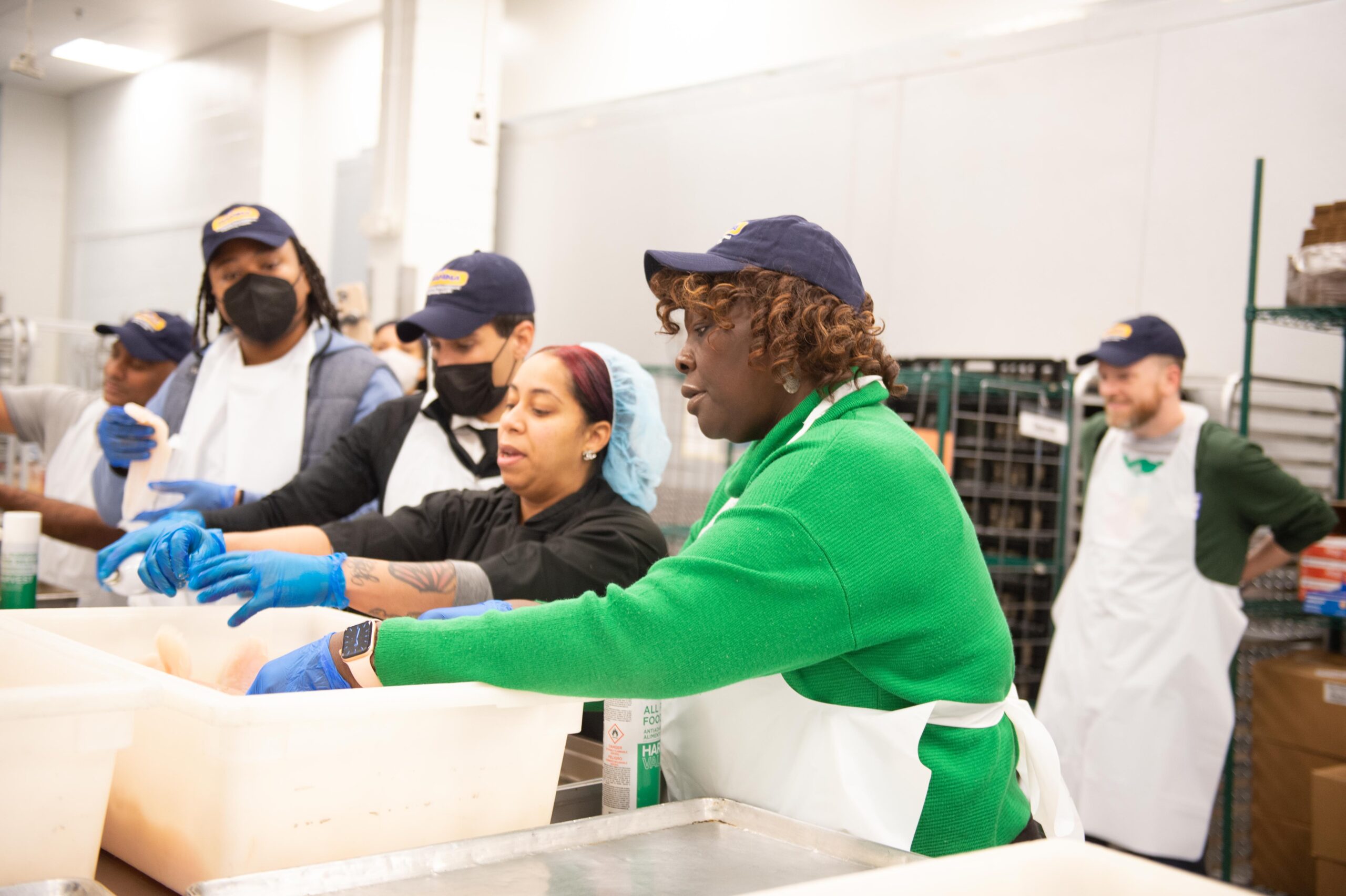Author: Alissa Vandenbark
Status of MANNA’s Federal Funding
MANNA EXPANDS EVIDENCE-BASED MEDICALLY TAILORED MEAL OPTIONS WITH NEW VEGETARIAN MENU
MANNA Earns New Accreditation From Food is Medicine Coalition
Just-Published Research from MANNA Shows Medically Tailored Meals can Improve Health Outcomes for Individuals with Serious Illness
MANNA Kicks Off 30th Annual Pie in the Sky Fundraiser with Pie Day at Lincoln Financial Field
From Kitchen to Clinic: MANNA Highlights Role of Nutrition in Healthcare for Medical Students
It’s no secret that nutrition can directly impact health outcomes, and it’s well documented that when nutrition is poor, those outcomes can be devastating. One study found that nearly half of the deaths related to heart disease, stroke and type 2 diabetes are associated with suboptimal eating habits (NIH).
MANNA’s mission is to help treat those with serious disease through nutrition. Its medically tailored meal (MTM) intervention is evidence-based and associated with reduced length of hospital stays, decreased hospital readmissions, and improved malnutrition risk (Journal of Primary Care & Community Health).
If proper nutrition can have such a tangible impact on positive health outcomes, then physicians need to know who to turn to for the best nutrition care and resources available to patients in their community. Medical school training is already jam-packed, and physicians don’t have the time or expertise to advise patients on their dietary needs. MANNA’s medically tailored meal program, which includes nutrition counseling provided by registered dietitians, exists to provide community members with the resources they need to maintain their nutritional status while managing their medical needs.
To help future physicians understand the impact of MTM programs, MANNA’s research arm, the MANNA Institute, hires medical fellows each academic year for an applied research experience. The Reid B. Reames Fellowship enables medical students to work on research projects that develop the body of evidence for “food as medicine.” Fellows study topics such as how MANNA’s MTM program affects malnutrition risk and the impacts of MTMs on health among heart failure patients. While some of the students begin their journey at MANNA unaware of the organization’s nutrition therapy mission, they quickly come to experience its role as a change agent in patient care.
“I needed volunteer hours, and my friend suggested that I check out MANNA,” said Kaitlyn Bartholomew, a 2022-2023 fellow. “I figured this would be like volunteering in any other kitchen, but when I watched the volunteer orientation video, I realized that MANNA’s work actually aligned perfectly with my interest in nutrition as a med student. I found out about the MANNA Institute and emailed the team to get involved with research.”
This is a common theme when people visit MANNA’s kitchen – there is a sense of hope, learning that an organization is tackling serious health issues through food. Strangers stand side-by-side in the kitchen, preparing and packing meals together in an effort to not only feed people, but heal them.
“I always had a great time volunteering during my undergrad at MANNA,” said 2023-2024 fellow Jeffrey Zhou. “But I saw my time there as helping provide folks who needed it with nutritious food. Once I started working as a fellow at the Institute, I saw the bigger picture of how incredibly broadly nutrition can affect people, and how this work is not just providing people with good food, but with proven treatments, [delivered] right to their door.”
As these young professionals advance in their careers, they will take the lessons they’ve learned from the MANNA Institute with them.
“Since my time at MANNA, I am now very thorough when I ask patients about their diets, where they live, if they have access to good food and transportation to get to the grocery store,” said Zhou. “I always knew that nutrition is a huge factor for your overall health, and I have personally always had an interest in nutrition and food as a way to stay healthy. But now, I see nutrition through the food-as-medicine lens, and I plan to take this with me throughout the rest of my career to ensure I treat patients to the best of my ability.”
The Reid B. Reames Fellowship program is in its third year at MANNA. So far, six soon-to-be doctors have experienced the “aha” moment that food truly is medicine.
“As with everything we do at MANNA, our goal for the Fellowship program is to enhance awareness, in this case among the next generation of physicians and care providers, of the role of diet in nutrition-related disease,” said Jule Anne Henstenburg, Director of The MANNA Institute.
To learn more about the MANNA Institute’s Reid B. Reames Fellowship program, visit https://mannapa.org/mannainstitute/reid-b-reames-fellowship/.
Main Course Returns Sept 26th Featuring Award-Winning Philadelphia Chefs and Fabulous Entertainment!
On Thursday, September 26th the Metropolitan Area Neighborhood Nutrition Alliance (MANNA) will host our annual premier culinary fundraiser, Main Course, at Cescaphe’s newest venue, The Switch House. In partnership with MANNA, Chef Chairs Amanda Shulman of Her Place Supper Club – named Food & Wine’s 2023 Best New Chef — and Alex Kemp of My Loup –2024 James Beard Award Seminfinalist for Best New Restaurant — will bring together Philadelphia’s finest culinary talent, including several James Beard Award winners and semifinalists. This one-night-only event will provide guests with a top-tier offering of Philadelphia’s finest cuisine, all while benefiting MANNA’s work to provide medically tailored meals to those suffering from critical illnesses throughout Greater Philadelphia. The evening will feature a live auction, luxury raffle and a live performance from Philadelphia’s Most Legendary Drag Queen, Martha Graham Cracker.
“We’re so honored to co-chair MANNA’s 2024 Main Course event,” said Chef Chairs Amanda Shulman and Alex Kemp. “Last year’s Main Course chef chairs, Chefs Omar Tate and Cybill St. Aude-Tate of Honeysuckle Provisions left huge shoes for us to fill. We’re beyond grateful to the incredible chefs who are contributing their time and energy to this year’s lineup.” Chefs from a dozen different restaurants will prepare and showcase unique dishes throughout the evening for guests to enjoy. Several of Philadelphia’s top chefs will be participating in this year’s Main Course, along with Chef Chairs Amanda Shulman (Her Place Supper Club) & Alex Kemp (My Loup), including Joey Baldino (Zeppoli), Melissa McGrath (Sweet Amalia), Marc Vetri and Matt Rodrigue (Fiorella), Jesse Ito (Royal Izakaya), Carlos Aparicio (El Chingon), Ian Graye (Pietramala), Dan Tsao (Emei), Randy Rucker (River Twice), Andrew DiTomo (Meetinghouse), Justine MacNeil (Fiore Fine Foods), Daniel Griffiths, Sam Kalkut and Jake Loeffler (Paffuto), as well as the MANNA and Cescaphe chefs.
“We’re so grateful to be partnering with renowned chefs and entertainers for an amazing evening that will benefit our mission of delivering nutritious meals and counseling to individuals battling critical illnesses,” said Sue Daugherty, MANNA’s CEO. “MANNA is very fortunate to have the incredible Philadelphia chef community, this year led by Chef Chairs Amanda and Alex, to help us shine a light on the power of food as medicine and bring further awareness to the importance of providing nutritious, medically tailored meals and counseling to our neighbors in need. We are also thrilled to welcome back Martha Graham Cracker — a champion of MANNA’s since our early days — for another showstopping performance.”
Main Course 2024 is co-chaired by MANNA Board member Jimmy Contreras and radio producer Marisa Magnatta. Sponsorship and table packages are available now at mannapa.org/maincourse24 or by emailing Kate Milicia (kmilicia@mannapa.org). Limited ticket sales will open on August 1.
Main Course 2024 is presented by Andréa W. & Kenneth C. Frazier Family Foundation. Main Course sponsors (as of 6/18) include: Cescaphe Black, John Alchin and Hal Marryatt, Hamilton Lane, JPMorgan Chase, ChatterBlast, 20/20 Visual Media, Allan Schimmel, Bank of America, Independence Blue Cross, The Haverford Trust Company, Camden Apothecary, Martin and Monica Lupinetti, and McLaughlin Private Wealth.
Malnutrition Awareness Week 2023
On September 18-22, 2023, MANNA will take part in Malnutrition Awareness WeekTM, an international effort to increase the awareness, diagnosis, and treatment of malnutrition in patients. Malnutrition Awareness WeekTM is an annual, multi-organizational campaign created by the American Society for Parenteral and Enteral Nutrition (ASPEN) to focus on nutrition as a patient right and nutrition’s vital role in health and recovery.
In the U.S., malnutrition – the condition that occurs when individuals do not receive enough calories, protein, or vitamins and minerals for optimal body function and overall health – affects millions of people and is especially common among people with medical conditions. Malnutrition affects an estimated 20 to 50% of hospitalized patients, and can contribute to longer hospital stays, increased weakness and frailty, and higher hospital readmission rates.
MANNA’s medical nutrition program helps to treat and prevent malnutrition for many critically ill clients each year. Indeed, preliminary findings from the MANNA Institute showed an average 34% reduction in the proportion of clients who screened at-risk for malnutrition at intake versus follow-up across all disease states that we served in 2020. A partnership with researchers and dietitians at the Hospital of the University of Pennsylvania is currently building on these findings by measuring MANNA’s impact on recently discharged heart failure patients who were experiencing malnutrition while hospitalized.
In addition to tailored nutrition, malnutrition treatment requires professional guidance from healthcare providers such as Registered Dietitian-Nutritionists (RDNs), accredited and nationally board-certified food and nutrition experts. MANNA is committed to advancing the dietetics field by sharing vital information about detecting and treating malnutrition. This September, I wanted to share more information about the ways MANNA both directly addresses malnutrition and raises awareness about this serious issue.
Addressing malnutrition at MANNA
MANNA serves over 100 critically ill clients annually with diagnosed malnutrition, but many more are at serious risk. For these clients, appropriate nutrition and professional guidance are critical to mitigate potentially devastating consequences.
“Malnutrition is something to handle on a case-by-case basis, especially because it can affect people in different ways,” says MANNA dietitian Mallory Drake, MPH, RDN, LDN, CHES. “Among our population, we see a lot of weight changes and occasionally noted micronutrient deficiencies.” Malnutrition can affect clients who struggle with weight gain or obesity as well as weight loss.
“Our biggest interventions would be offering our high-protein menu modification to provide additional calories and protein when it is needed,” Mallory says. As with all MANNA diet modifications, our high-protein menu can be combined with up to two additional diet modifications to suit our clients’ unique needs. MANNA’s high-protein modification can help address malnutrition and prevent unintentional weight loss, sarcopenia, decreased muscle mass and function, increased infections, and poor wound healing by providing additional protein in a client’s diet.
In addition to this diet modification, MANNA’s RDNs can provide nutrition counseling to discuss small steps a client and their support system can take to improve overall nutrition status.
“Through counseling, we are able to talk through barriers to regular eating and food access beyond the short-term period of receiving MANNA deliveries,” Mallory says. The best ways to prevent malnutrition and its complications are to ensure consumption of adequate calories and protein on a consistent basis, through meals, snacks, supplements, and/or calorically dense foods. “If a client is open to it, we can discuss their meal timing and when they may be able to work in extra nutrition to meet their increased needs.”
MANNA’s RDNs take a trauma-informed approach to nutrition counseling, helping ensure that a client’s lived experiences are accounted for as a holistic component of their healing. For many clients, speaking with a MANNA RDN is their first experience talking in-depth with a healthcare provider about the importance of nutrition in managing their health. Together with MANNA’s fortifying, medically tailored meals, our RDNs help reduce the impacts of malnutrition among our critically ill clients.
Malnutrition and children
MANNA serves a small but growing number of pediatric clients. In our fiscal year 2023, we served nearly 200 children with diabetes, obesity, and other serious health conditions. Approximately 6% of the children MANNA served were diagnosed with malnutrition.
Preventing malnutrition among children is especially critical. Children with malnutrition are more susceptible to infections, which increases the risk for mortality. A July 2023 study featured stark data about the devastating prevalence of childhood malnutrition:
- Researchers studied more than 4,000 children over eight years who were admitted to the Pediatric Intensive Care Unit (PICU). About one of every five PICU-admitted patients had a malnutrition diagnosis.
- Malnourished patients had more comorbid diagnoses and used more healthcare resources (prolonged hospitalizations and higher 30-day readmission rates), leading to higher healthcare costs. Indeed, estimated total costs were $151,401 for malnourished patients and $57,986 for patients without malnutrition—a cost difference of $93,415 per patient.
A number of risk factors can make infants and children more susceptible to malnutrition. Conditions such as gastrointestinal, heart, respiratory, and kidney defects; cerebral palsy; cystic fibrosis; short bowel syndrome; solid tumor cancers; and third-degree burns all put infants and children at high risk. Socioeconomic and systemic factors such as food insecurity can compound this risk by inhibiting access to nutrient-dense foods. Programs such as MANNA’s play a vital role in addressing pediatric malnutrition by providing high-calorie, protein-rich meals that are delicious and ready to eat. MANNA’s RDNs can help counsel families affected by pediatric malnutrition to ensure healing and recovery.
MANNA’s Commemoration of Malnutrition Awareness WeekTM
To amplify the theme of this year’s Malnutrition Awareness WeekTM, “Nutrition Care is a Patient Right,” we are hosting two events in early October. The first is an RDN (Registered Dietitian-Nutritionist)/DTR (Dietetic Technician, Registered) Networking Event to be held on October 2nd that aims to share MANNA’s dietetic expertise with the local healthcare community and engage dietitians from the Greater Philadelphia Area to help address malnutrition at their own institutions. If you or your business are interested in learning more about partnership opportunities for MANNA’s inaugural RDN/DTR Networking Event, please contact Rebecca Boova-Turner, Healthcare Partnerships Manager at rboova-turner@mannapa.org.
The MANNA Institute, our division for research and evaluation, has been an ambassador of Malnutrition Awareness WeekTM since 2020 and will be hosting an academic seminar on October 5th. The seminar is part of the Institute’s Academic Seminar Series, a bi-annual presentation on topics relating to in-patient and community-based nutrition care. Our speaker, Dr. Rose Ann DiMaria-Ghalili of Drexel University, will discuss malnutrition across the healthcare continuum and potential interventions. One (1) continuing education unit will be available for all RDNs who attend. Registration information for the seminar will be available soon. We can all play a part in spreading awareness about malnutrition. As an ambassador, MANNA is able to provide complimentary access to all of ASPEN’s Malnutrition Awareness WeekTM webinars. Use code MAW-MANNA to register. We hope you are able to learn more about the complex issue of malnutrition and ways to take action during this year’s Malnutrition Awareness WeekTM and beyond!
